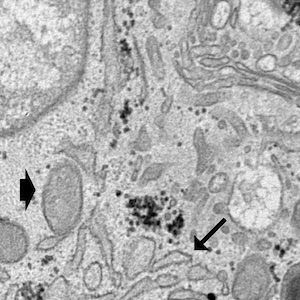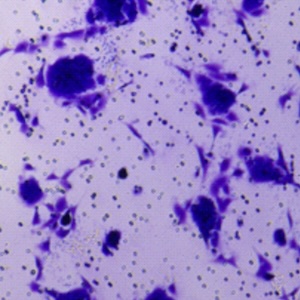About the Journal
The European Journal of Histochemistry was founded in 1954 by Maffo Vialli and published till 1979 under the title of "Rivista di Istochimica Normale e Patologica", from 1980 to 1990 as "Basic and Applied Histochemistry" and in 1991 as "European Journal of Basic and Applied Histochemistry". It is now published under the auspices of the University of Pavia, Italy. The European Journal of Histochemistry is the official organ of the Italian Society of Histochemistry and, since 2022, of the Italian Group for the Study of Neuromorphology (G.I.S.N.), and a member of the journal subcommittee of the International Federation of Societies for Histochemistry and Cytochemistry (IFSHC).
The Journal publishes original papers concerning investigations by histochemical and immunohistochemical methods, and performed with the aid of light, super-resolution and electron microscopy, cytometry and imaging techniques. Coverage extends to:
- functional cell and tissue biology in animals and plants;
- cell differentiation and death;
- cell-cell interaction and molecular trafficking;
- biology of cell development and senescence;
- nerve and muscle cell biology;
- cellular basis of diseases.
The histochemical approach is nowadays essentially aimed at locating molecules in the very place where they exert their biological roles, and at describing dynamically specific chemical activities in living cells. Basic research on cell functional organization is essential for understanding the mechanisms underlying major biological processes such as differentiation, the control of tissue homeostasis, and the regulation of normal and tumor cell growth. Even more than in the past, the European Journal of Histochemistry, as a journal of functional cytology, represents the venue where cell scientists may present and discuss their original results, technical improvements and theories.
Articles reporting studies in which the investigation was not conducted using a histochemical approach and where histochemistry and microscopy played no significant analytical or informational role will not be considered.
The European Journal of Histochemistry does not accept Case Reports or Case Series.
Introduction
Peer review is applied to all research articles and the majority of other article types published in European Journal of Histochemistry. This entails at least two independent, expert peer reviewers.
Letters to the Editor may be subject to peer review at the Editors' discretion.
Policy
All submissions to European Journal of Histochemistry are first checked for completeness (criteria for desk reject are available in the Guide for Authors) before being sent to an Editor, who decides whether they are suitable for peer review. If an Editor is on the author list or has a competing interest in a particular manuscript, another member of the Editorial Board will be assigned to oversee peer review. When making a decision, Editors will consider the peer-reviewed reports, but they will not be bound by the opinions or recommendations contained in them. A single peer reviewer's or the Editor's concern may result in the manuscript being rejected. Peer review reports are sent to authors along with the editorial decision on their manuscript.
At European Journal of Histochemistry papers undergo a single-blind review process - meaning that the reviewers’ identity is not shared with the authors.
Selection
Peer reviewer selection is critical to the publication process. A variety of factors influence it, including expertise, reputation, specific recommendations, conflicts of interest, and previous performance. All of these qualities are highly desirable: speed, thoroughness, sound reasoning, and collegiality.
Before accepting an invitation to review a manuscript, potential peer reviewers should notify the Editor of any potential conflicts of interest. Editors' and peer reviewers' communications contain confidential information that should not be shared with third parties.
European Journal of Histochemistry is committed to making editorial decisions and publishing them as soon as possible, and we believe that an efficient editorial process benefits both our authors and the research community as a whole. As a result, we ask reviewers to respond within the agreed-upon time frame. If reviewers anticipate a delay, we ask that they notify us so that we can keep the authors updated and, if necessary, find alternative solutions.
Diversity and equity
European Journal of Histochemistry is committed to diversity, equity, and inclusion, and strives for demographic diversity among peer reviewers. When inviting peer reviewers, editors are bly encouraged to consider geographical regions, gender identities, racial/ethnic groups, and other groups.
Misconduct
False or misleading information, such as identity theft and suggesting fake peer-reviewers, will result in the manuscript being rejected, further investigation in accordance with the Publisher’s misconduct policy (https://www.pagepress.org/site/plagiarism_misconduct), and notification to the authors' institutions/employers. The Publisher follows the Committee on Publication Ethics (COPE) guidance about peer reviewer fraud/falsification.
Guidance
The primary goal of peer review is to provide the Editor with the information needed to make a fair, evidence-based decision that adheres to the journal's editorial criteria. Review reports should also assist authors in revising their paper so that it can be accepted for publication. Reports that include a recommendation to reject the paper should explain the major flaws in the research; this will help the authors prepare their manuscript for possible re-submission (if allowed by the Editor) or submission to a different journal.
A quick guide to reviewing is available here
Before submitting a report, reviewers should ask themselves the following questions:
- How would you react if you received this report?
- Do you find the tone offensive?
- Is it polite and professional?
- Do the authors or their competitors receive any unnecessary personal or antagonistic remarks?
Please keep in mind that any offensive language in your report may be removed by the Editor.
All papers are published as soon as they have been accepted, by adding them to the "current" volume's Table of Contents.
European Journal of Histochemistry is fully compliant with open access mandates and provides immediate open access to its content on the principle that making research freely available to the public supports a greater global exchange of knowledge.
This journal utilizes the PKP Preservation Network, the Global LOCKSS Network and Portico to create a distributed archiving system among participating libraries and permits those libraries to create permanent archives of the journal for purposes of preservation and restoration.
The Publisher allows and encourages authors to deposit both their pre- and post-prints in Open-Access institutional archives or repositories. The primary benefit of pre- and post-print self-archiving is reaching a larger audience which enhances the visibility and impact of your research.



